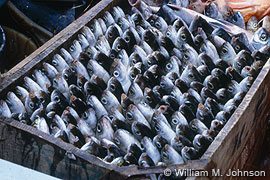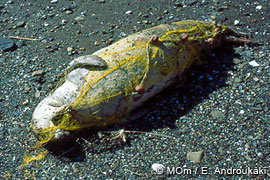

 |
||
 |
||
Vol. 12 (2): November 2009 |
||
Tackling the conflict between seals and fisheries in Greece: An end or a beginning?Stella Adamantopoulou and Vangelis ParavasMOm, Athens, Greece
June 2009 marked the end of MOm’s 4-year LIFE-Nature programme "Monk Seal and Fisheries: Mitigating the Conflict in Greek Seas" (MOFI). The objective of the project was to improve the conservation status of the largest population of the Mediterranean monk seal in the world by mitigating the negative consequences of the monk seal-fisheries interaction to both the seals and the fisheries sector. The undertaking appeared ambitious from the start and the difficulties that we would face were many. A lack of support by the state, a continuous change of political executives in key areas for the project, and a lack of united representation from the coastal fishermen, was disappointing but in no way discouraged us from our goals. In four years, we managed to acquire a comprehensive picture of the magnitude and intensity of the interaction between monk seals and fisheries. Through necropsies we were better able to understand the repercussions of the coastal fishery on the monk seal while, through surveys with the fishermen, we could measure the damage to fishing gear caused by seals and dolphins. Through research activities we estimated that the extent of the damage to fishing gear from seals is close to 20% of the fishing trips undertaken, while the entanglement of mainly young seals in fishing nets represents 55% of the death causes recorded, being a primary threat for the species. For the first time, we also investigated the feeding habits of the species and revised the National Strategy for the Conservation of Mediterranean monk seals in Greece. The sensitization and the active participation of local fishing communities and students through awareness campaigns and environmental education constituted another important aspect of the programme. Finally, in close collaboration with WWF-Greece and the Fisheries Research Institute of Kavalla, we drafted for the first time in Greece an Action Plan aimed at reducing seal-fishery interactions. The Action Plan fills an important void in Greece because, until today, no other initiative has been undertaken at the national level. The final objective is for the Plan to be adopted by the relevant Ministries, becoming a basic tool in the configuration of policy. All of these positive steps show that even if the programme has reached its end, the hour for action has only just begun!
|
 |
|
|
|
The key findings of the 196 questionnaires completed among coastal fishermen in the project “hot spot” areas are:
Similar proposed solutions were recorded in the 64 questionnaires completed by Port Police authorities throughout the country and from 7 Fishery Departments.
Based on data from 19 aquaculture enterprises that participated in the project, it was found that monk seals cause considerable damage and that aquaculture operators use as an effective solution the installation of external reinforced nets.
From the experimental fishing conducted in Alonnisos and Kimolos the following key results were obtained:
 |
|
|
|
MOFI’s Rescue Team responded to 15 cases of animals needing help. In two of these cases, the seals were newborn pups, requiring immediate transfer to MOm’s Seal Treatment and Rehabilitation Centre at Alonnisos. Following an intensive treatment programme, the animals were released in healthy condition back to their natural environment.
From the 29 necropsies conducted during the MOFI project it was evident that the main cause of death for adult seals, was deliberate killing (44%), and for sub-adult animals, entanglement in fishing gear (56%). Most of the dead animals were recorded in May. Despite the fact that human related mortality remains at high levels, during the project a gradual decrease in mortality was recorded especially in deliberate killing.
For the first time the dietary preferences of the Mediterranean monk seal were studied. Through the study of 24 monk seal stomach contents and the analysis of stable isotopes of tissues of monk seals and marine organisms it became evident that:
MOm. 2009. Action Plan for the mitigation of the negative effects of monk seal ‐ fisheries interactions in Greece, Summary Report. MOm, WWF Greece, Fisheries Research Institute, 2009: 1-11. [PDF  2.9 MB]
2.9 MB]
Notarbartolo di Sciara, G., S. Adamantopoulou, E. Androukaki, P. Dendrinos, A.A. Karamanlidis, V. Paravas and S. Kotomatas. 2009. National strategy and action plan for the conservation of the Mediterranean monk seal in Greece, 2009 ‐ 2015. Report on evaluating the past and structuring the future. Publication prepared as part of the LIFE‐Nature Project: MOFI: Monk Seal and Fisheries: Mitigating the conflict in Greek Seas. Hellenic Society for the Study and Protection of the Mediterranean monk seal (MOm), Athens. 1-70. [PDF  3.4 MB]
3.4 MB]
Copyright © 2009 Stella Adamantopoulou, Vangelis Paravas, The Monachus Guardian. All Rights Reserved |